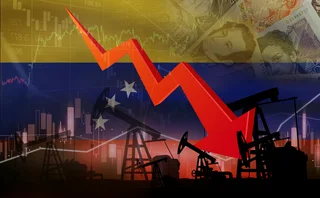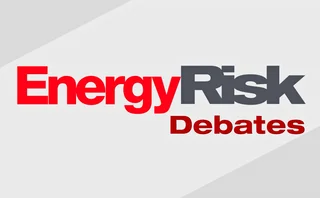Energy Risk Commodity Rankings 2024: markets buffeted by geopolitics and economic woes
Winners of the 2024 Commodity Rankings steeled clients to navigate competing forces

The geopolitical tensions and economic woes of 2023 highlighted the critical role of commodity derivatives markets in managing risk at times of stress. While commodity markets in 2023 were generally calmer than 2022 when Russia’s invasion of Ukraine caused eye-watering price spikes, there were still bursts of volatility, physical supply disruptions, illiquidity and rising credit risk to contend with.
Overall, the story was one of falling prices, with oil, natural gas and base metals registering losses over 2023. Brent crude dropped around 5% on the year, averaging $83 a barrel (/bbl) in 2023 versus a 2022 average of $101/bbl, according to the US Energy Information Administration. Prices were more volatile in the second half of the year as supply dropped and the Organization of Petroleum Exporting Countries Plus announced an extension to production cuts. Rising geopolitical tensions amid the Israel-Hamas conflict from October onwards also drove oil prices higher at the end of the year.
Meanwhile, gas prices in Europe plummeted during 2023 as mild winter temperatures and economic concerns led to significant demand destruction. Dutch TTF gas futures fell around 60% on the year, from €86.71 per megawatt hour (/MWh) on January 2, to €34.56/MWh on December 26. US gas prices also fell but gained some support from Asian demand for liquefied natural gas. Henry Hub futures fell around 38% over 2023, averaging $2.57 per million British thermal units (MMBtu) in 2023.
LME base metals as a whole also fell in 2023, largely as a result of contractions in manufacturing production in the US and Europe. LME nickel saw the biggest losses, falling by 45% over the year.
Against this backdrop, commodity producers and consumers were reliant on large commodity firms, banks and brokers to facilitate much-needed hedges and mitigate counterparty credit risk.
The annual Commodity Rankings survey invites market participants to vote for their preferred firms in a variety of categories across the commodities complex. This year’s winners are the firms deemed to have provided excellent services to their clients in uncertain and unpredictable circumstances. This year’s Rankings provides a new section in which firms were able to vote not only for the markets and products offered by brokers and dealers, but for specific qualities that their preferred counterparties exhibit.
For example, Axpo was voted first for ‘pricing’, ‘reliability’, and ‘flexibility’ amongst others, while GEN-I scooped first place for ‘creativity and innovation’. In terms of brokers, SCB Group gained the top slot for ‘reliability’ and ‘flexibility’.
To see the Commodity Rankings tables in full, click here.
How the poll was conducted
The Energy Risk Commodity Rankings survey was live between October 31, 2023 and January 29, 2024 and received valid responses from 1,716 individuals.
The survey asked respondents to vote for their top three dealers and brokers in markets in which they had been active over the previous year. The rankings poll is designed to reflect market participants’ perception of a dealer or broker based on the overall quality of service they offer their clients. It is not intended to reflect volumes traded in any market. Instead, respondents vote according to a range of criteria including reliability, pricing, liquidity provision and speed of execution.
In order to create the final list of rankings, Energy Risk aggregates the results, weighting them by awarding three points for a first place, two points for second place and one point for third. The points are then added up and the highest placed firms in each category are listed in the Rankings tables. The Overall Rankings (Best overall dealer and Best overall broker etc) are calculated by adding up all the points accrued to each firm across the different sections (Oil, Gas, Power etc). Following closure of the poll, the results are subject to an internal review process, which can result in categories being dropped or aggregated if they do not have enough votes. The outcome of the review is final.
More on Risk management
Energy firms revisit CTRM systems as tech advances
Energy executives mull how to tap into the explosion of new technologies entering the risk space, but systems selection must consider future business needs, writes Yefreed Ditta at Value Creed
CRO interview: Brett Humphreys
Brett Humphreys is head of risk management at environmental markets specialist Karbone. He talks to Energy Risk about the challenges of modelling outcomes in unpredictable times and how he’s approaching the risks at the top of his risk register
How geopolitical risk turned into a systemic stress test
Conflict over resources is reshaping markets in a way that goes beyond occasional risk premia
Energy Risk Debates: the influence of risk culture
The panellists examine different risk cultures and discuss the risk manager’s role and influence in creating a risk culture
Energy Risk reaction: Venezuela and oil sanctions
Energy Risk talks to Rob McLeod at Hartree Partners about the energy risk implications of the US’s control of Venezuelan oil
CRO interview: Shawnie McBride
NRG’s chief risk officer Shawnie McBride discusses the challenges of increasingly interconnected risks, fostering a risk culture and her most useful working habits
Increasingly interconnected risks require unified risk management
Operational risk is on the rise according to a Moody's survey, making unified risk management vital, say Sapna Amlani and Stephen Golliker
Energy Risk Europe Leaders’ Network: geopolitical risk
Energy Risk’s European Leaders’ Network had its first meeting in November to discuss the risks posed to energy firms by recent geopolitical developments








